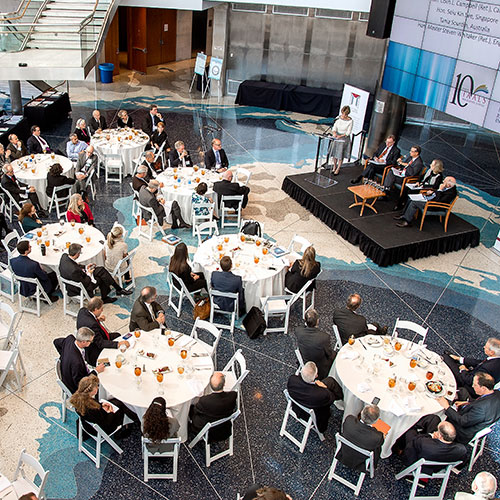One Step Closer to Creating the Just, Speedy, and Inexpensive Courts of Tomorrow
 Last Thursday and Friday, February 25 and 26, IAALS hosted its Fourth Civil Justice Reform Summit, focused on creating the just, speedy, and inexpensive courts of tomorrow. The goal of the Summit was to bring together federal and state court judges, court administrators, attorneys on both sides of the “v”, academics, and users of the system to chart the next steps for creating the just, speedy, and inexpensive courts of tomorrow.
Last Thursday and Friday, February 25 and 26, IAALS hosted its Fourth Civil Justice Reform Summit, focused on creating the just, speedy, and inexpensive courts of tomorrow. The goal of the Summit was to bring together federal and state court judges, court administrators, attorneys on both sides of the “v”, academics, and users of the system to chart the next steps for creating the just, speedy, and inexpensive courts of tomorrow.
It was a packed two-day Summit that covered the waterfront—current civil justice reform efforts around the country at the state and federal levels, simple cases to complex cases, the importance of case management by judges and the court, and the varying perspectives of the users of the system. The Summit provided a unique opportunity for discussion about the state of innovation across our federal and state courts—and a corresponding unique opportunity to share lessons that can be learned from those very different experiences and dockets.
Some immediate takeaways:
- Fair and efficient implementation of the federal rule changes and the recommendations from the Conference of Chief Justices Civil Justice Improvements Committee at the state level are paramount. We are not at the finish line yet, and we need to remain committed to ensuring these changes have a positive impact on the ground.
- Judges play an essential role in this implementation—for the individual cases before them and as leaders in the system more broadly—and thus education and engagement of our judges at the federal and state levels is critical.
- Courts play an equally important role. As we learned from our keynote speaker, Judge Carolyn Kuhl, Presiding Judge of the Superior Court of California for the County of Los Angeles, all court officers and court staff must think outside the box to meet the ultimate goal of our system—service to litigants.
- Technology is a short-term challenge but also a long-term answer to creating the courts of tomorrow. Technology is an essential component in ensuring that courts will be able to meet the expectations and needs of our system’s users.
- Cultural change must go hand in hand with all of the above in order to achieve real and lasting reform.
IAALS Executive Director Rebecca Love Kourlis began the Summit by imagining a court system in five years, where we had litigation that is cost effective, courts that are accessible and affordable, technology that serves litigants, judges who are engaged and attentive, and lawyers who are cooperative and innovative. The Summit ignited a renewed energy and commitment to achieving this goal. That energy was palpable in the room, which was filled with attendees from across the nation and the world who are united in their dedication to making the system better.
Our goal is to spread that vision and energy beyond the Summit.
Bloomberg BNA has featured the Summit in three articles following the Summit: the first on the new rules and the importance of culture change, the second on putting effective judicial case management into play, and the third on why case management is in all our interest. Law Week Colorado has also reported on the event, recognizing the important role of culture change in implementation.
Stay tuned for more news and updates regarding the Summit over the coming months.


